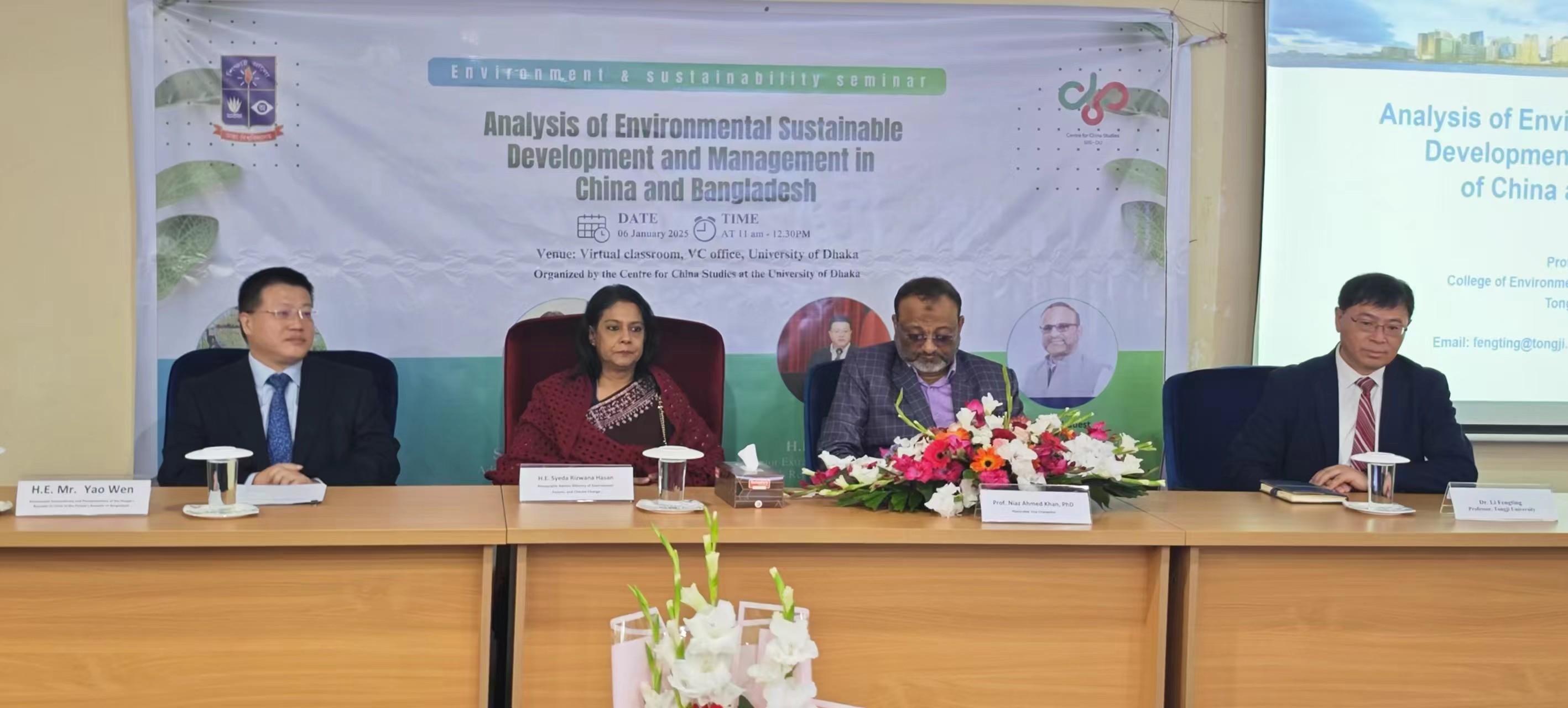
Dhaka, January 6, 2025 — A significant seminar on Environmental Sustainable Development and Management between China and Bangladesh was held at the University of Dhaka on Monday. Organized by the university’s Center for Studies, the event took place in the virtual classroom at the Vice Chancellor’s office.
The seminar was attended by key officials, including the Chief Guest, Syeda Rizwana Hasan, Environment, Forest, and Climate Change Advisor to Bangladesh’s interim government. Special guests included Li Aiyan, the Ambassador of China to Bangladesh, Professor Niaz Ahmed Khan, Vice Chancellor of Dhaka University, and Honorary Chairman of the Chinese Enterprises Association in Bangladesh, Mr. Zhuang Lifeng, along with Inspector General of Police (Ret.) Abdus Salam PPM. Officials from the Chinese Embassy, scholars of environmental science, and prominent professors and students from Dhaka University also participated in the event.
Speaking at the seminar, Vice Chancellor of Dhaka University, Professor Niaz Ahmed Khan, noted that the event was an excellent way to celebrate the 50th anniversary of diplomatic relations between China and Bangladesh. He also highlighted the university’s growing emphasis on China studies, stressing that Dhaka University is increasingly focused on strengthening its academic and research collaboration with China.
HE Mr. Yao Wen, Ambassador Extraordinary and Plenipotentiary of the People's Republic of China to the People's Republic of Bangladesh mentioned ongoing commitment to Bangladesh’s environmental protection, pointing to significant projects such as the Daserkandi wastewater treatment plant and the North Dhaka waste treatment plant. These initiatives are crucial for improving Bangladesh’s environmental status and the well-being of its people. He reiterated China's readiness to deepen its partnership with Bangladesh in environmental conservation.
Syeda Rizwana Hasan, the Chief Guest, called for enhanced cooperation between the two countries, particularly in sharing expertise on controlling air pollution. She stressed that Bangladesh could benefit greatly from China's innovative environmental policies and strategies. Rizwana emphasized that Bangladesh must focus on developing sustainable management practices instead of trying to control nature itself. "We need to redesign development patterns that respect nature and hold polluters accountable," she stated.
Rizwana also pointed out that Bangladesh had already started working with China on shared river data, helping both nations prepare for the long-term impacts of environmental changes on river systems.
Among the prominent speakers, Dr. Li Fengting, Professor at Tongji, delivered the keynote address. His presentation focused on China's achievements in sustainable development, including advancements in environmental management, circular economy practices, and environmental laws. Dr. Li’s expertise and experience were key to understanding China’s approach to sustainability and its application to global environmental challenges. His presentation also explored how both nations could draw from each other's progress to enhance their environmental strategies.
Dr. Li emphasized the importance of cooperation between China and Bangladesh, particularly in managing shared environmental challenges like air quality and water resources. "Both nations have much to learn from each other in terms of policies, innovations, and the community-driven approach to sustainable development," he noted.
The seminar also saw contributions from Professor Shamsad Mortuza, Director of the Office of International Affairs at Dhaka University. The event concluded with a dynamic Q&A session, highlighting the interest of students and researchers in advancing sustainable environmental practices.
In closing, the seminar reinforced the shared vision of both nations for sustainable development and highlighted the critical need for continued collaboration in managing environmental challenges. The discussions underscored the importance of rethinking development models, focusing on sustainability, and ensuring that both countries can work together towards a more resilient future.